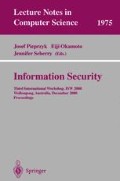Abstract
Designing a practical and complete electronic cash scheme has proved difficult. Designs must seek to optimise often conflicting metrics such as efficiency, anonymity, the ability to make exact payments. Gains in one area often result in a loss in one or more other areas. Several schemes have accepted linkability of some payments as a concession to getting the balance right. A point that has not been highlighted is the problem of preventing linking between payments made with different linkable coins. This paper reviews several electronic cash schemes which have the linkability property and concludes that linking across coins is of significant practical concern. Design improvements are suggested along with observations regarding the user’s active role in preserving anonymity.
This research is part of an ARC SPIRT project undertaken jointly by Queensland University of Technology and Telstra
Access this chapter
Tax calculation will be finalised at checkout
Purchases are for personal use only
Preview
Unable to display preview. Download preview PDF.
References
R. J. Anderson and M. Kuhn. Low cost attacks on tamper resistant devices. Security Protocols, 5th International Workshop Proceedings, pages 125–135. Springer-Verlag, 1998.
R. Anderson and M. Kuhn. Tamper resistance-a cautionary note. Second USENIX Workshop on Electronic Commerce, pages 1–11, 1996. USENIX.
S. Brands. An efficient off-line electronic cash system based on the representation problem. Technical Report CS-R9323, Centrum voor Wiskunde en Informatica (CWI), March 1993.
S. Brands. Untraceable off-line cash in wallets with observers. Advances in Cryptology-CRYPTO’93, pages 302–318. Springer-Verlag, 1993.
E. Brickell, P. Gemmell, and D. Kravitz. Trustee-based tracing extensions to anonymous cash and the making of anonymous change. Proceedings of the Sixth Annual ACM-SIAM Symposium on Discrete Algorithms (SODA’95), pages 457–466, 1995.
A. Chan, Y. Frankel, and Y. Tsiounis. Easy come — easy go divisible cash. Advances in Cryptology-EUROCRYPT’98, pages 561–576, Springer-Verlag, 1998.
D. Chaum and T. Pedersen. Wallet databases with observers. Advances in Cryptology-CRYPTO’92, pages 89–105. Springer-Verlag, 1993.
D. Chaum. Blind signatures for untraceable payments. Advances in Cryptology-CRYPTO’82, pages 199–203. Plenum Press, New York and London, 1983, 23–25 August 1982.
T. Eng and T. Okamoto. Single-term divisible electronic coins. Advances in Cryptology-EUROCRYPT’94, pages 306–319. Springer-Verlag, 1995.
M. Jakobsson. A practical mix. Advances in Cryptology-EUROCRYPT’98, pages 448–461. Springer-Verlag, 1998.
M. Jakobsson and M. Yung. Revokable and versatile electronic money. 3rd ACM Conference on Computer and Communications Security, pages 76–87, 1996. ACM Press.
T. Okamoto and K. Ohta. Disposable zero-knowledge authentications and their applications to untraceable electronic cash. Advances in Cryptology-CRYPTO’89, pages 481–496, Springer-Verlag, 1990.
T. Okamoto and K. Ohta. Universal electronic cash. Advances in Cryptology-CRYPTO’91, pages 324–337, Springer-Verlag, 1992.
T. Okamoto. An efficient divisible electronic cash scheme. Advances in Cryptology-CRYPTO’95, pages 438–451. Springer-Verlag, 1995.
B. Pfitzmann and M. Waidner. How to break and repair a “provably secure” untraceable payment system. Advances in Cryptology-CRYPTO’91, pages 338–350, Springer-Verlag, 1992.
C. Radu, R. Govaerts, and J. Vandewalle. Efficient electronic cash with restricted privacy. Financial Cryptography: First International Conference, FC’ 97, pages 57–69, 1997. Springer-Verlag.
M. K. Reiter and A. D. Rubin. Crowds: Anonymity for web transactions. Technical Report 97–15, DIMACS, April 1997.
Y. Tsiounis. Efficient Electronic Cash: New Notions and Techniques. PhD thesis, Northeastern University Boston, 1997.
A. C. Yao. Protocols for secure computations. 23rd IEEE Symposium on Foundations of Computer Science, pages 160–164. IEEE Press, 1982.
Author information
Authors and Affiliations
Editor information
Editors and Affiliations
Rights and permissions
Copyright information
© 2000 Springer-Verlag Berlin Heidelberg
About this paper
Cite this paper
Maitland, G., Reid, J., Foo, E., Boyd, C., Dawson, E. (2000). Linkability in Practical Electronic Cash Design. In: Goos, G., Hartmanis, J., van Leeuwen, J., Pieprzyk, J., Seberry, J., Okamoto, E. (eds) Information Security. ISW 2000. Lecture Notes in Computer Science, vol 1975. Springer, Berlin, Heidelberg. https://doi.org/10.1007/3-540-44456-4_12
Download citation
DOI: https://doi.org/10.1007/3-540-44456-4_12
Published:
Publisher Name: Springer, Berlin, Heidelberg
Print ISBN: 978-3-540-41416-2
Online ISBN: 978-3-540-44456-5
eBook Packages: Springer Book Archive

